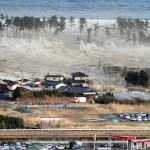energy
One of the most important realizations of climate change research is exemplified in this graphic from Weather Uderground:
Caption from original: "Rate of temperature change today (red) and in the PETM (blue). Temperature rose steadily in the PETM due to the slow release of greenhouse gas (around 2 billion tons per year). Today, fossil fuel burning is leading to 30 billion tons of carbon released into the atmosphere every year, driving temperature up at an incredible rate.:
The point is this. The PETM (Paleocene-Eocene thermal maximum, millions of years ago) was a period of high levels of…
If we, Western Civilization, had started out with electric cars, and a century later someone came along with the idea of exploding little dollops of gasoline mixed with air to propel them, that person would be thought insane.
Depending on price, the cost of energy to propel an electric car a given distance can be about 5% of the cost to propel a gas-explosion style car. The electricity to power the electric car can be produced in any number of ways, some icky some cleaner, but much more efficiently. Some of that energy can be generated where the car is parked, at home or work, under a…
This is more than a policy. It is a philosophy.
John Abraham has an interesting post up at the guardian called "Global warming action: good or bad for the poor?" It is a response to a post by a group of guys who tend to write annoying stuff about climate change (you can go to John's post for that information). Here, I want to make a brief comment related to John's excellent post.
The crux of John Abraham's post is this, in two parts: 1) Some have argued that mitigation against climate change is bad for "the poor" (read: people in developing countries) because they have a right to go through the same phases of technological and social…
Peak Oil is a controversial concept. Some people actually think that the production of oil in nature is continuous (which is a tiny bit, but hardly at all, true) so we can keep pumping oil out of the ground and it will just keep being produced by tiny microbes. But aside from that particular, and annoying, made-up controversy, "real" Peak Oil (or should I say Peak Real Oil) is still controversial. Peak Oil is defined as the moment when the maximum rate of petroleum extraction occurs, and thereafter production declines steadily, like on a bell curve. But that is, in my view, the wrong way…
Amazon Prime Air might want to pay attention to this research. Scientists have studied the flight patterns of albatrosses to understand how the animals are able to sustain flight with minimal energy expenditure.
New research provides more evidence of how birds conserve energy by flying in a "V" formation:
4-methylcyclohexane methanol is a chemical used to clean coal before it is burned. As you know a region of southern West Virginia where upwards of 100,000 people live has been affected by a spill of this chemical; the water supply in this area has been made unavailable for human use. A 48,000 gallon storage tank for 4-methylcyclohexane methanol has been leaking the chemical into the Elk River, which is part of the municipal water supply in the area.
Apparently there isn't a lot known about this particular chemical. It's chemical name is scary looking, and resembles the names of other better…
"The results of my observation are best explained by the assumption that a radiation of very great penetrating power enters our atmosphere from above." -Victor Hess
You might think of the largest and most powerful particle accelerators in the world -- places like SLAC, Fermilab and the Large Hadron Collider -- as the source of the highest energies we'll ever see. But everything we've ever done hear on Earth has absolutely nothing on the natural Universe itself! For this week's Ask Ethan, let's take a look at the simple question of our reader David Hurn, who asks:
Ever since I was a young…
This just in:
New Oil Change International interactive graphic shows growing fossil fuel reserves in contrast to shrinking global carbon budget
WASHINGTON, DC – New analysis by Oil Change International shows that global fossil fuel reserves continue to expand while the Intergovernmental Panel on Climate Change and other scientific and industry analysts repeatedly show that our remaining budget for burning fossil fuels has shrunk to less than one third of existing reserves.
The Oil Change analysis shows that fossil fuel companies gained access to more than twice as much in fossil fuels as they…
Learning is easy. Getting it right is harder. Expunging falsehoods is hardest, but most rewarding.
There is a "meme" (using the definition of a meme as something most people in a certain community think whether it is true or not) that to produce one gallon of Ethanol for fuel you have to use some larger number (I've heard two, and I've heard five) gallons of gasoline.
In an ideal world there would be farms with giant solar collectors and wind generators. These devices would produce electricity to run distilling machines and hybrid tractors and such. On the farm would be grown GMO plants…
And a little taste of what the beginning of the end of civilization might look like. Maggie wrote this book and here she is on TV:
Visit NBCNews.com for breaking news, world news, and news about the economy
I was in South Africa for this. No problem with the lights there.
"It followed from the special theory of relativity that mass and energy are both but different manifestations of the same thing — a somewhat unfamiliar conception for the average mind." -Albert Einstein
You've heard and seen it plenty of times: Einstein's most famous equation, E = mc2. I've taken you inside this equation before, which lays out how much energy is stored in matter-at-rest, and tells you how much energy you need to create matter in the first place.
Image credit: Niels Madsen, ALPHA / Swansea / CERN.
That's right, you can create matter directly from energy; we do it all…
Coal-fired electricity production is bad on so many levels.
You'd think humans could learn from history, but sadly, no, and no. The childhood asthma statistics alone should be enough. Coal burning power plants are a leading producer of asthma causing pollution. And then there's the mercury...and the mountain-top removal, and the waste products..and, well, when do we say "enough"?
"As seismologists gained more experience from earthquake records, it became obvious that the problem could not be reduced to a single peak acceleration. In fact, a full frequency of vibrations occurs." -Charles Francis Richter
You've all been around long enough to be familiar with the severe damage that earthquakes can cause, rattling and cracking the ground, shaking down buildings, and creating catastrophic tsunamis tidal waves. In short, the largest ones that occur in the wrong places will cause billions of dollars worth of damage and will kill thousands of people.
Image credit: AP /…
"Orbiting Earth in spaceship, I saw how beautiful our planet is. People, let us preserve and increase beauty, not destroy it!" -Yuri Gagarin
Fifty-two years ago today, the first human being left Earth, and we began our journey into outer space. But back in 1961, we didn't really know how far outer space stretched, or where all the matter and energy in the Universe came from.
Image credit: NASA, 1962.
That all changed with the discovery of the Cosmic Microwave Background (by Penzias and Wilson, with the Horn Antenna, above), and subsequent measurements that led us to the Big Bang picture of…
The Pacific Institute has done extensive and groundbreaking research over the past 25 years on a wide range of water, climate, energy, and environmental issues. One focus has been on how to use water more efficiently to do the things we want to do – a focus on “efficiency” and “productivity” – not deprivation.
Society could certainly cut water use by removing urban lawns, or never washing our cars again, or eliminating irrigated alfalfa in the desert. But we've never recommended these things. Why? Not because the water savings from such changes are small: some of these things…
We’re bombarded with numbers every day. But seeing a number and understanding it are two different things. Far too often, the true “significance” of a figure is hidden, unknown, or misjudged. I will be returning to that theme often in these blog posts in the context of water, climate change, energy, and more. In particular, there is an important distinction between accuracy and precision.
Here is one example – reported cases of cholera worldwide. Cholera is perhaps the most widespread and serious water-related disease, directly associated with the failure to provide safe drinking water and…
Welcome to the first post in my new National Geographic ScienceBlogs column “Significant Figures.” I look forward to sharing my thoughts with you on a wide range of environmental science-related issues, data, and people, and to a productive and constructive interaction.
My background? I’m an environmental scientist by training and inclination, with experience in engineering, hydrology, climatology, and interdisciplinary analysis. My research and writing have, for over thirty years, focused on water resources, climate dynamics and change, energy, risk assessment, and the synthesis and…
See the way those smooth, amorphous blobs rapidly transform into textured honeycombs? Something similar is probably happening right now inside your laptop or smartphone’s battery, providing you with portable power.
But the cherished efficiency and portability of those compact lithium-ion batteries comes with a cost: each cycle of discharge/recharge degrades the material’s essential structure and ultimate longevity - you’ve probably noticed that your older electronics just don’t hold a charge like they used to. Preventing this persistent degradation requires insight into a process that plays…












